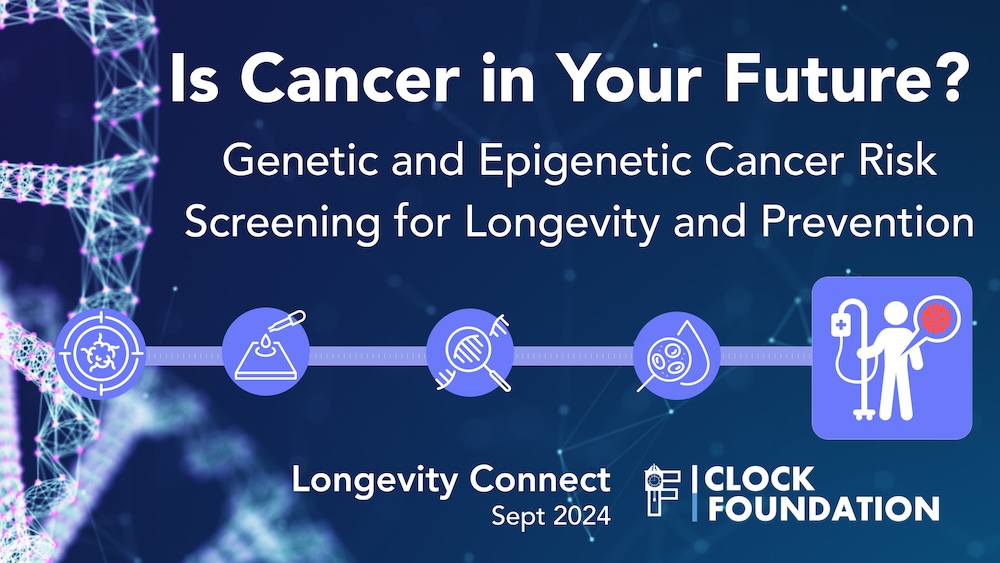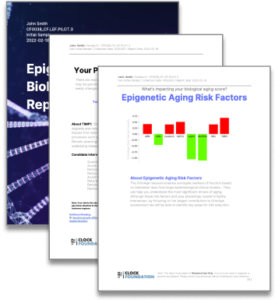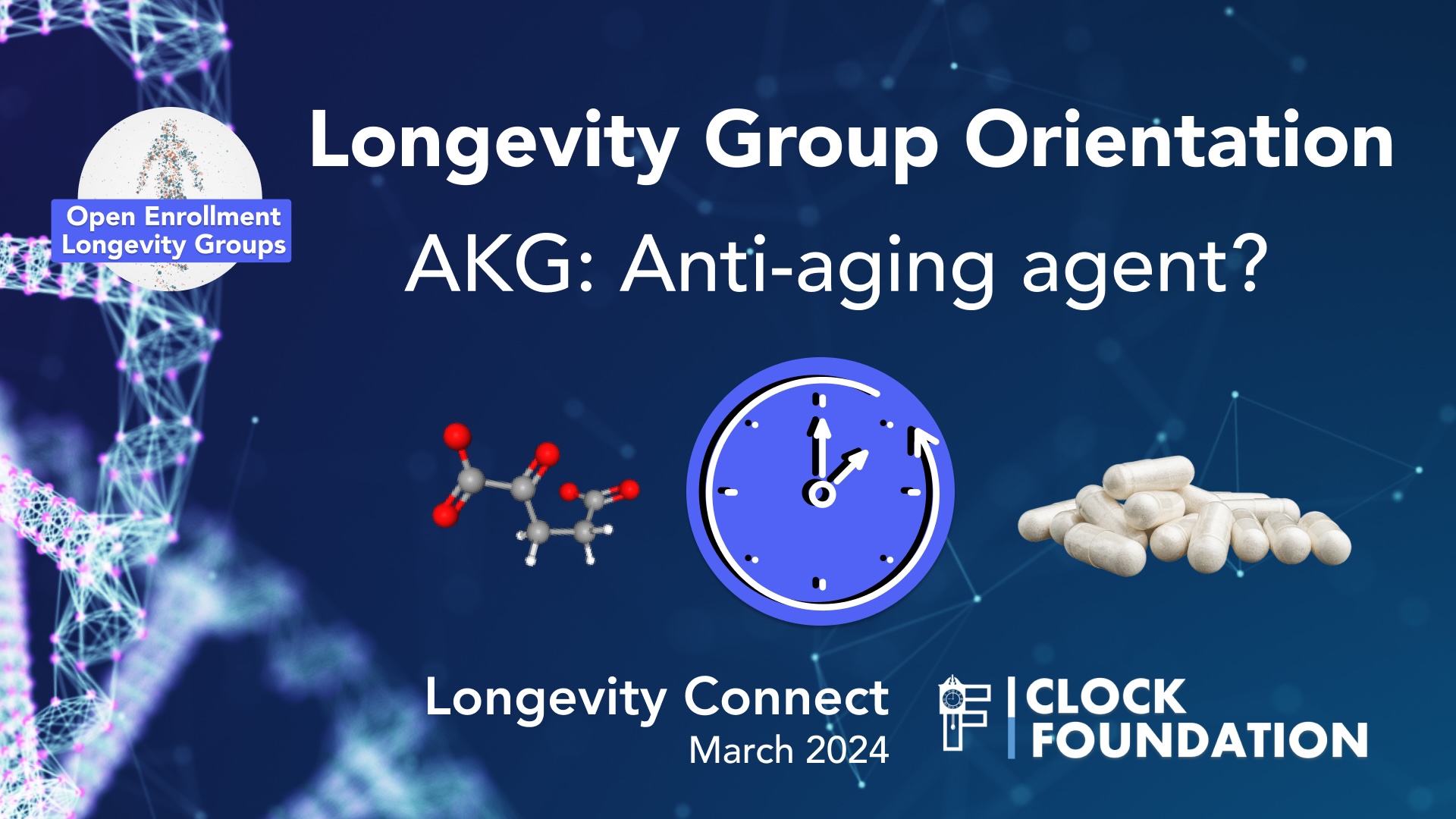Write-up and recap coming soon! Time: Thursday, Sept 26, 2024 at 9am PST / 12 EST / 6pm Paris. As we age, the risk of developing cancer increases. But how can we better understand, screen for, and mitigate this growing threat? Cancer is one of the leading causes of death worldwide, responsible for nearly 1 […]
Stay up-to-date on latest anti-aging research from top longevity scientists.
Clock Foundation and MyAgingTests.com presents
Longevity Connect
💥 Is Cancer in Your Future? Advanced Genetic and Epigenetic Cancer Risk Screening for Longevity and Prevention 🛡️
Next Event: Thursday, Sept 26, 2024 at 9am PST / 12 EST / 6pm Paris

What is "Longevity Connect"?
Longevity Connect is a Monthly Longevity Science and Anti-Aging Strategies Virtual Meetup.
Brought to you by Clock Foundation and MyAgingTests.com, we share upcoming programs and trials. Answer questions on biological age tests and present about research and tools longevity researchers, doctors and pursuers can use.
Presented and hosted by Bobby Brooke and Mark Koester with special guests and community discussions.

Upcoming Agenda and Future Talks

FAQ Learn about Report and Tools
For Individuals, Physicians and Clinical Research Leaders

Assistance with Interpretation of Test Reports

Sept 2024 Meeting Agenda
💥 Is Cancer in Your Future? Advanced Genetic and Epigenetic Cancer Risk Screening for Longevity and Prevention 🛡️
Time: Thursday, Sept 26, 2024 at 9am PST / 12 EST / 6pm Paris.
As we age, the risk of developing cancer increases. But how can we better understand, screen for, and mitigate this growing threat?
Cancer is one of the leading causes of death worldwide, responsible for nearly 1 in 5 deaths annually in the U.S (>600,000 people each year).
Cancer is a complex group of diseases marked by abnormal cell growth that can invade or spread to other parts of the body. Despite significant research and advancements, fully understanding, screening, and treating cancer remains a challenge. However, new tools and techniques are emerging to offer more personalized and proactive approaches.
In this month’s Longevity Connect webinar, you’ll discover how cutting-edge genetic and epigenetic methods—along with innovations like liquid biopsies and DNA testing—can help you assess and reduce your cancer risk.
Learn how these advancements are transforming cancer prevention and longevity strategies, empowering you to take control of your health as you age.
Key Topics:
- 💥 Cancer as a Complex and Heterogeneous Disease: What is cancer? What are the fundamental mechanisms that drive it, from genetic mutations (in oncogenes and tumor suppressor genes) to environmental factors (like smoking and radiation), and how do these factors impact your health as you age?
- 🩺 Cancer Screening Guidelines: When should you be screened for cancer? What tests to consider, like colonoscopy, mammograms, PSA testing for prostate cancer? And how do these guidelines change as we age?
- 💉 Can Liquid Biopsies Detect Cancer Risk?: Considering Cancer Tests from Galleri, Guardant or others for early cancer detection? How do these advanced non-invasive tests work, and what can they reveal about your cancer risk and progression?
- 🧬 What Can Genetic and Epigenetic Tests Tell You?: How do your genetic predispositions (like BRCA gene) and epigenetic markers (like biological age and GrimAge) offer early insights into your cancer risk and disease prediction?
- 📊 Monitoring Cancer Risk for Longevity Trials & Treatment Programs: What role does cancer risk monitoring play in personalizing longevity trials and treatment plans?
- 🕰️ Epigenetic Age & Cancer Risk?: How can DNA methylation clocks help assess and predict cancer risk and track its progression over time?
- 🛡️ How Can You Lower Your Cancer Risk?: What are some evidence-based strategies, from lifestyle changes to emerging therapies, that can reduce cancer risk and promote longevity? Ex. regular exercise, metformin, rapamycin, and diets for reducing cancer risk.
- 🚀 What Are the Latest Advances in Cancer Treatment?: Explore cutting-edge cancer therapies that are transforming treatment today, from immunotherapy to targeted gene therapy.
Don’t miss this opportunity to advance your knowledge and strategies for leveling up your longevity intervention strategies.
Hosted by Clock Foundation’s Executive Director Bobby Brooke and Head of Product Mark Koester.
- With Top Scientists and Speakers from the Longevity and Aging Research Space
- Latest Longevity News and Analysis of Recent Papers on Aging Clocks, Aging Mechanism Studies and Anti-Aging Interventions and Treatments.
Longevity Connect Videos and Recaps
Videos, Key Takeaways, Reviewed Papers, and Full Transcripts
On July 25, 2024, Bobby Brooke and Clock Foundation / MyAgingTests.com team hosted another Longevity Connect webinar. The topic was “Longevity Treatment Strategies.” During the event, Brooke shared an evaluative and science-based summary of longevity treatments available now, what criteria to consider when choosing anti-aging interventions and some best practices for anyone creating or optimizing […]
On May 23, 2024, the Clock Foundation team hosted another Longevity Connect webinar. This latest edition explored the GrimAge Test, its report, and the associated Systems Aging Risk Factors. GrimAge Test is the epigenetic biological age test used by top longevity researchers and has been taken by thousands to to track their biological age and […]
On March 21, 2024, the Clock Foundation team hosted another Longevity Connect webinar. This session focused on exploring the Open Enrollment Groups Initiative and our initial cohort attempting to validate anti-aging effects of AKG. Head of Product Mark Koester demo-ed the usage of the Longevity Tracker portal for completing key enrollment surveys and managing your […]
Latest in Longevity: Aging Research Highlights with Bobby Brooke (Longevity Connect – February 2024)
On February 15, 2024, the Clock Foundation’s Executive Director, Bobby Brooke, led an inaugural session of Longevity Connect. The aim of this session was to sift through the deluge or “firehose” of new information that is flooding the longevity field and highlight key papers and findings that have emerged in the last few weeks and […]
Our Biological Age Tests and Plans
Measure Your Aging. Contribute to Longevity Research.
 USA
USA
 Europe
Europe
 UK
UK
 USA
USA
PhenoAge Test
_________
-
Lab Blood Test
-
Biological Age Report
-
1-on-1 Longevity Consultation
Advanced 3-for-1 Biomarker Monthly Plan
_________
-
PhenoAge Tests (4x per year)
-
GrimAge Epigenetic Tests (2x per year)
-
Monthly Wearables Aging Biomarker Report
-
Longitudinal Tracking Reports
-
Eligibility for Longevity Groups
(Epigenetic)
GrimAge Test
_________
-
At-Home Blood Test
-
Epigenetic DNA Methylation Analysis
-
Advanced Healthy Aging Report
-
1-on-1 Longevity Consultation
 Europe
Europe
(Epigenetic)
GrimAge Test
_________
-
At-Home Blood Test
-
Epigenetic DNA Methylation Analysis
-
Advanced Healthy Aging Report with unique longevity intervention recommendations
-
1-on-1 Longevity Consultation
PhenoAge
_________
-
Lab Blood Test
-
Biological Age Report
-
1-on-1 Longevity Consultation
 UK
UK
(Epigenetic)
GrimAge Test
_________
-
At-Home Blood Test
-
Epigenetic DNA Methylation Analysis
-
Advanced Healthy Aging Report with unique longevity intervention recommendations
-
1-on-1 Report Review & Portal Training
PhenoAge
_________
-
Lab Blood Test
-
Biological Age Report
-
1-on-1 Longevity Consultation
(Epigenetic)
GrimAge Test
_________
-
At-Home Blood Test
-
Epigenetic DNA Methylation Analysis
-
Advanced Healthy Aging Report with unique longevity intervention recommendations
-
1-on-1 Longevity Consultation
PhenoAge
_________
-
Lab Blood Test
-
Biological Age Report
-
1-on-1 Longevity Consultation
We are currently unable to directly offer our biological aging tests outside of USA, Canada, Europe or UK. Please contact [email protected] to request availability and testing options in other locations.
~
Recent Media Coverage & Interviews
Frequently Asked Questions
Biological age refers to your age on a biological level compared to your chronological age or how many birthdays have passed for you.
Biological age tests look at changes in your biology that are indicative of biological aging. In our case, our biological age test uses what is called an epigenetic clock to calculate your biological age.
Fortunately, your biological age is modifiable, meaning you can change it. Tracking your biological age can help you see changes over time and understand the impact diet, lifestyles changes, and anti-aging treatments are having on your rate of aging.
Both tests determine biological age and associated risks.
PhenoAge is calculated using levels of 9 clinical biomarkers circulating in blood, which were found to strongly correlate with onset of age-related diseases and mortality.
GrimAge Test is an epigenetic test and predicts your biological age based on DNA methylation, basically changes in your DNA over time. GrimAge is the “gold standard” in longevity research offers and offers personalized aging drivers, risk factors and tailored recommendations for longevity.
PhenoAge Test involves a blood (plasma) lab test and takes just a few days to get your results, while a GrimAge involves an at-home blood collection kit, which you ship back to our lab for processing, DNA extracting and sequencing, and report processing. GrimAge takes a few weeks to complete and get your report.
After ordering a single test or a package, you’ll receive a welcome email detailing how our program works and the steps ahead.
For U.S. participants, this initial email will include:
- A link to an online survey to register your test kit and complete a brief intake questionnaire;
- A form that enables you to obtain your first blood draw, along with instructions on how to schedule an appointment; and
- Instructions on how to collect and return your at-home blood collection kit.
For a PhenoAge Test, you will receive your initial test report including your results as soon as each of the above steps have been completed (within approximately 1 week). Once you receive your initial results, you’ll also be able to book a 1-on-1 consultation with our team to discuss.
Results of our advanced Epigenetic Test are usually available within 4-6 weeks.
Our subscription and longevity biomarker plans combine the two biological aging tests used by longevity researchers with wearable monitoring, providing cutting-edge longevity intervention tracking and aging monitoring.
Our wearables monitoring plan integrates with Oura, FitBit, Google, Garmin and an assortment of health trackers. Data is sync regularly and you’ll receive a personal month report proving HRV Age as well as sleep, activity and other aging metric.
You’ll receive access to our longevity tracking portal to review and monitor your health data and reports as well as tools to track and manage your longevity interventions and actions.
Cancellations are accepted at anytime, but in order to obtain test results from a submitted sample, it requires having an active subscription for at least 2 months to cover costs.
We currently only ship to the United States, UK and Europe and serviced by labs in Los Angeles, USA, and Manchester, UK.
Please contact us if you are located elsewhere and are still interested in purchasing a test or participating in an anti-aging trial.
A genetic or DNA test looks at what your DNA contains whereas an epigenetic age test measures various epigenetic changes on our DNA itself. Unlike DNA, your epigenetics are modifiable.
Many cells in the body have an “epigenetic clock” that keeps track of how quickly they are aging or, more accurately, how much damage has been done since they were created.
Our test provides your biological age as well as various key drivers of your aging.
Our tests are based on epigenetic data. Unfortunately we are not able to compute GrimAge based from genetic data provided by Ancestry or 23&Me. We require epigenetic data and specifically IDAT files provided by epigenetic test providers. There are many service labs around the world who provide this type of service using testing provided by Illumina methylation arrays (such as the EPIC methylation beadchip)
Longevity Groups are participatory research initiatives facilitated by the Clock Foundation. These groups allow individuals to collectively explore the effects of various anti-aging treatments, supplements, and protocols. Participants track their biological age and other biomarkers to help generate reliable data on the effectiveness of different interventions.
Learn more and signup here.
Epigenetics is the study of how genes are turned off and on during an animal’s lifetime, including humans.
A Greek word meaning “above genetics”, epigenetics is the study of changes in gene function that occur without detectable changes to DNA sequence. What this means is that your gene expression (like what proteins your cells produce) changes but your gene sequences themselves do not change.
Epigenetics most often involves changes that affect gene activity and expression. These epigenetic changes can occur due to normal biological development but they can also result from external or environmental factors like food choices, stress levels or even injury.
DNA methylation is a process where methyl groups are added to DNA to influence gene expression, and which are critical for normal human development, defining cell identity, as well as for rejuvenation and reprogramming. Highly accurate estimators of chronological age have been developed are known as epigenetic aging clocks, which can predict chronological age through development and across the lifespan (Horvath 2013, Horvath & Raj 2018).
Increasingly these clocks are also being used as a measure of biological age as certain measures – most notably GrimAge (Lu 2019, Li 2020), which is able to predict future morbidity and mortality risk. GrimAge also performs well for predicting functional decline and onset of major age-related diseases, including heart disease, cancer onset, multi-modal measures of brain health, kidney disease, fatty liver, respiratory function, and more (Lu 2019, Hillary 2018, Hillary 2020, McCrory 2020). These peer reviewed and independent studies have also shown that it performs reliably across large diverse populations.
Many researchers conclude today that overall epigenetic clocks now represent the most robust measure of biological age (Li 2020, Jylhava et al 2017, Justice & Kritchevsky 2020).
WARNING: TESTS INTENDED FOR RESEARCH PURPOSES ONLY
These statements have not been evaluated by the Food and Drug Administration. These products are not intended to screen, diagnose, treat, cure, or prevent any disease or condition or assess risk of any disease or condition. Unless advised by your healthcare professional, biological age should not be used to determine or alter any age-related health or medical treatments based on your chronological age.
Let’s Stay In Touch
© 2023 Clock Foundation.




